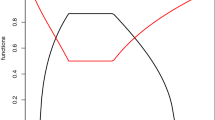Abstract
The purpose of the present paper is to provide a method for constructing time-dependent reliability systems based on intuitionistic fuzzy random variables. A lifetime variable cannot be precisely recorded due to machine errors, experimentation pitfalls, personal judgments, estimation errors or other unexpected sources of error. In order to satisfy the purpose of this paper, an intuitionistic fuzzy random variable with exact parameters was introduced and adopted to evaluate the reliability functions of a k-out-of-n system, with some reliability evaluation criteria discussed and interpreted. Numerical evaluations were further presented to illustrate the calculation of the system reliability criteria in the form of intuitionistic fuzzy numbers. Finally, a number of potential engineering applications of the proposed method were presented.



Similar content being viewed by others
References
Aliev IM, Kara Z (2004) Fuzzy system reliability analysis using time dependent fuzzy set. Control Cybern 33:653–662
Atanassov K (1986) Intuitionistic fuzzy sets. Fuzzy Sets Syst 20:87–96
Atanassov K (1994) New operations defined over the intuitionistic fuzzy sets. Fuzzy Sets Syst 61:137–142
Baraldi P, Podofillini L, Mkrtchyan L, Zio E, Dang VN (2015) Comparing the treatment of uncertainty in Bayesian networks and fuzzy expert systems used for a human reliability analysis application. Reliab Eng Syst Saf 138:176–193
Chaube S, Singh SB (2016) Fuzzy reliability of two-stage weighted-k-out-of-n systems with common components. Int J Math Eng Manag Sci 1:41–51
Dong YG, Chen XZ, Cho HD, Kwon JW (2003) Simulation of fuzzy reliability indexes. J Mech Sci Technol 17:492–500
Hafaifa A, Laaouad F, Guemana M (2009) A new engineering method for fuzzy reliability analysis of surge control in centrifugal compressor. Am J Eng Appl Sci 2:676–682
He Q, Yabing ZHA, Zhang R, Sun Q, Liu T (2017) Reliability analysis for multi-state system based on triangular fuzzy variety subset bayesian networks. Eksploat Niezawodn Maint Reliab 19:152–165
Hussian MA, Amin EA (2017) Fuzzy reliability estimation for exponential distribution using ranked set sampling. Int J Contemp Math Sci 12:31–42
Jamali S, Bani MJ (2017) Application of fuzzy assessing for reliability decision making. arXiv preprint arXiv:1707.01727
Jamkhaneh EB (2011) An evaluation of the systems reliability using fuzzy lifetime distribution. J Appl Math Islamic Azad Univ Lahijan 7:73–80
Kumar G, Bajaj RK (2014) Intuitionistic fuzzy reliability of K-out-of-N: G system using statistical confidence interval. Int J Appl Inf Syst 7:1–7
Kumar M, Yadav SP (2012) A novel approach for analyzing fuzzy system reliability using different types of intuitionistic fuzzy failure rates of components. ISA Trans 51:288–297
Kumar A, Yadav SP, Kumar S (2007) New approach for electric robot fuzzy reliability analysis. Int J Perform Eng 3:257–266
Kumar M, Yadav SP, Kumar S (2013) Fuzzy system reliability evaluation using time-dependent intuitionistic fuzzy set. Int J Syst Sci 44:50–66
Kwakernaak H (1978) Fuzzy random variables, part I: definitions and theorems. Inf Sci 19:1–15
Lee KH (2005) First course on fuzzy theory and applications. Springer, Berlin
Lee HM, Fuh CF, Su JS (2012) Fuzzy parallel system reliability analysis based on level \((\lambda, \rho )\) interval-valued fuzzy numbers. Int J Innov Comput Inf Control 8:5703–5713
Liu S, Zhang H, Li C, Lu H, Hu Y (2014) Fuzzy reliability estimation for cutting tools. Procedia CIRP 15:62–67
Mahapatra GS, Roy TK (2012) Reliability evaluation of complex system with fuzzy reliability of components using interval nonlinear programming. Electron J Appl Stat Anal 5:151–163
Panda DC (2016) A new method for evaluation of fuzzy reliability of multistage interconnection. Int J Res Appl Sci 3:14–20
Rao KD, Kushwaha HS, Verma AK, Srividya A (2009) A new uncertainty importance measure in fuzzy reliability analysis. Int J Perform Eng 5:219–226
Razak KA, Rajakumar K (2013) A study on fuzzy reliability measures. Appl Math Sci 7:3335–3343
Sharma MK (2017) Possibility and probability aspect to fuzzy reliability analysis of a network system. Global J Pure Appl Math 13:3641–3655
Tang Z, Lu Z, Xia Y (2013) Numerical method for fuzzy reliability analysis. J Aircr 50:1710–1715
Tao YR, Cao L, Huang ZH (2017) A novel evidence-based fuzzy reliability analysis method for structures. Struct Multidiscip Optim 55:1237–1249
Wu HC (2004) Fuzzy reliability estimation using Bayesian approach. Comput Ind Eng 46:467–493
Xu X, Mitra J (2010) Distribution system reliability evaluation using credibility theory. Int J Eng Sci Technol 2:107–118
Zadeh LA (1965) Fuzzy sets. Inf Control 8:338–353
Acknowledgements
The authors would like to thank the editor and anonymous reviewers for their constructive suggestions and comments, which improved the presentation of this work.
Author information
Authors and Affiliations
Corresponding author
Ethics declarations
Conflict of interest
The authors declare that they have no conflict of interest.
Ethical approval
This article does not contain any studies with human participants or animals performed by the authors.
Additional information
Communicated by V. Loia.
Publisher's Note
Springer Nature remains neutral with regard to jurisdictional claims in published maps and institutional affiliations.
Rights and permissions
About this article
Cite this article
Akbari, M.G., Hesamian, G. Time-dependent intuitionistic fuzzy system reliability analysis. Soft Comput 24, 14441–14448 (2020). https://doi.org/10.1007/s00500-020-04796-w
Published:
Issue Date:
DOI: https://doi.org/10.1007/s00500-020-04796-w




